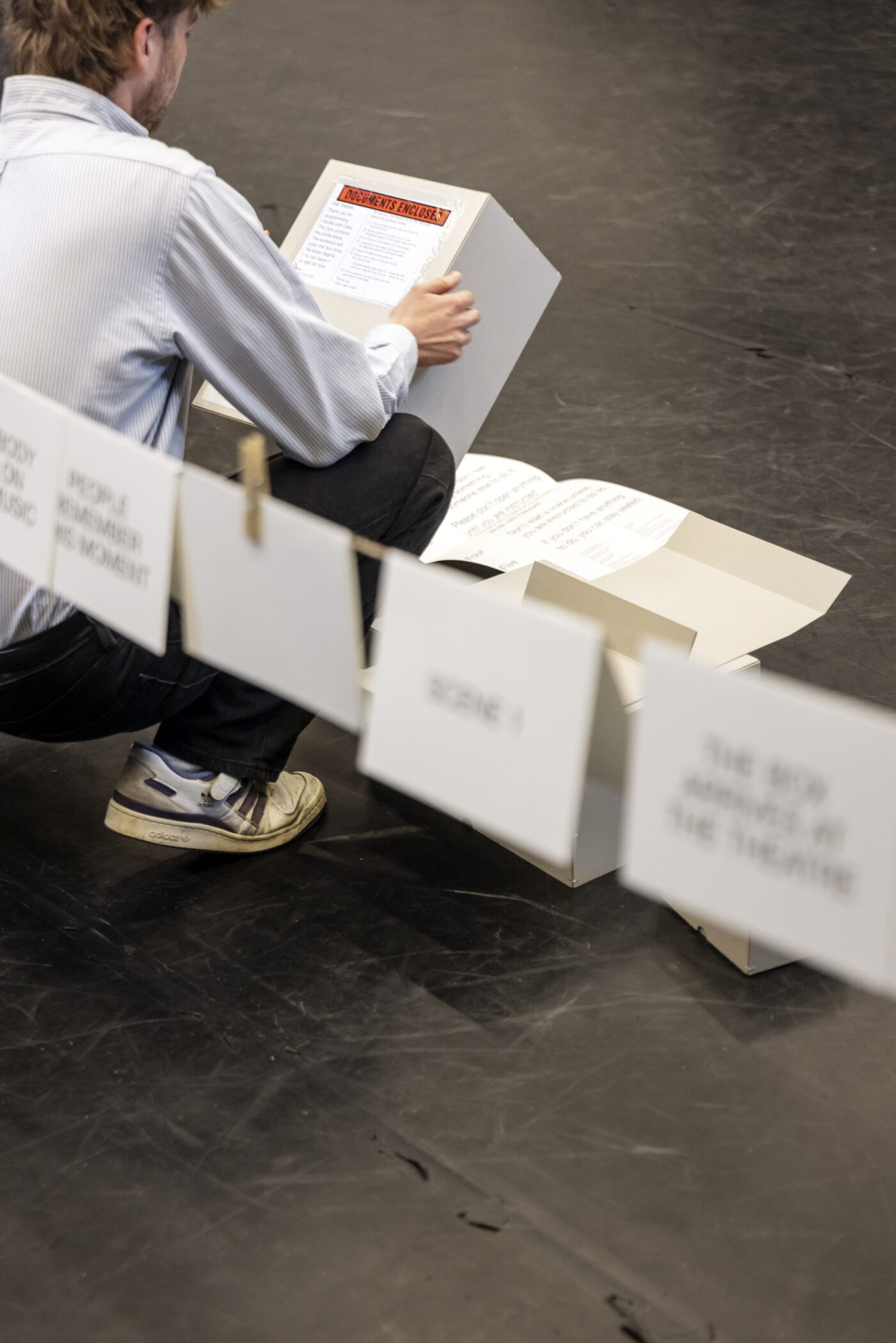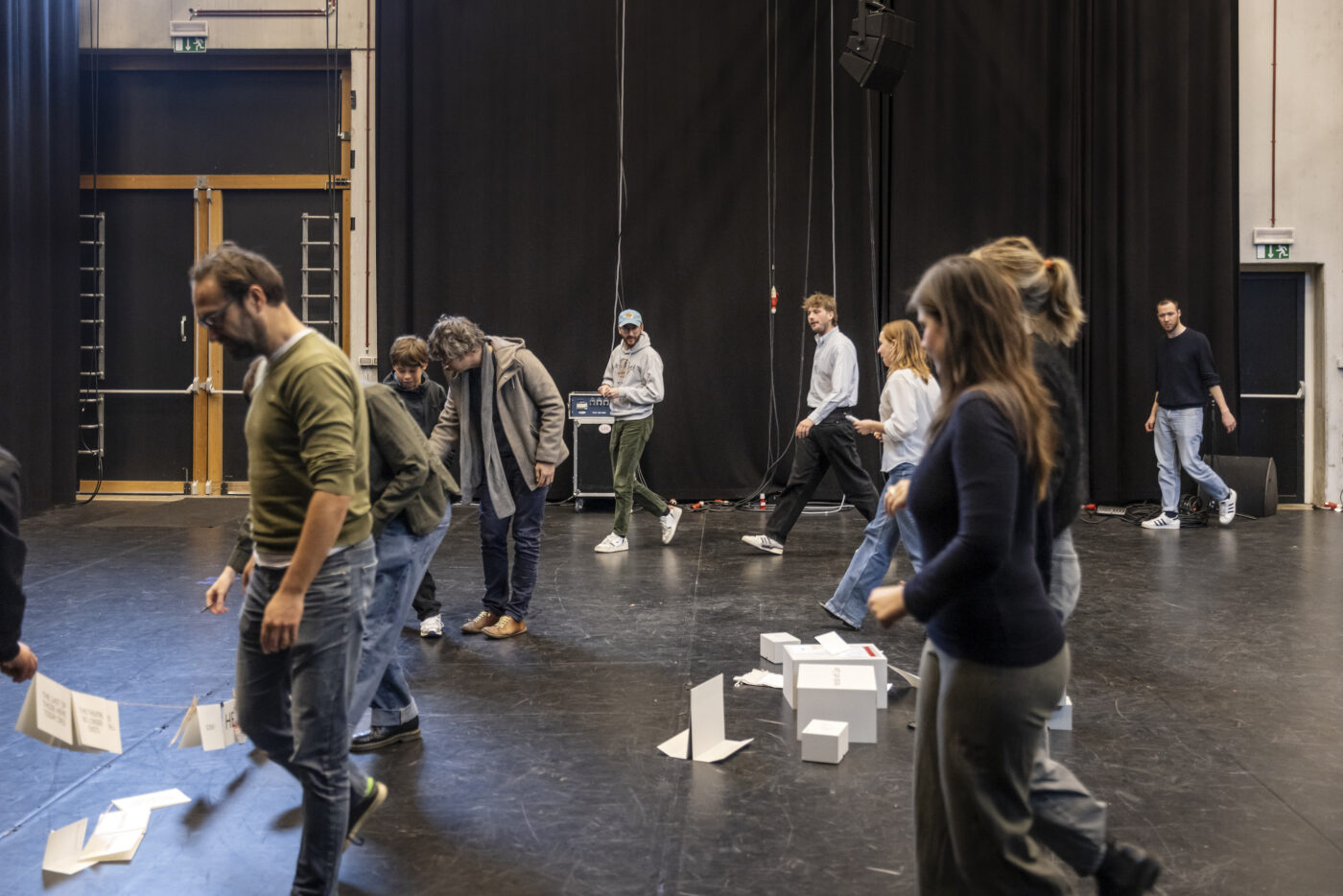
Where did you find the inspiration for this performance?
Alexander: 'During Corona, we all felt that those digital connections we made then didn't bring us closer together. The question was: can you make an analog connection with people you don't see, who aren't there? And can you do that through theatre?
But actually, it's about much more than just a Corona question. In a world of 8 billion people, this is today's challenge: how do you deal with people you don't know, but whom you do influence? How can you connect with them mentally and in contact?
Think about climate change: what do we do for generations that don't yet exist? What do we do for people we don't know, who live in areas we may or may not be connected to? We always need that (online) image of the other to make contact. But can we feel that connection in another way too?
I like to compare Handle with Care to board games - simple rules create real emotions and social interaction. Handle with Care is a kind of kickstarter for social interaction. That's why I love theatre so much, because it's inherently social.'
Samir: 'The result became a theatre performance in a box. Handle with Care needs no actors, no technicians, no director. We send the theatre a box with simple instructions: put the box on stage, make light, place notes on the seats for the audience. From then on, the performance unfolds by itself.'
What does the title mean?
Samir: 'Handle with Care obviously nods to the stickers placed on shipping boxes. But it's also about the gentleness with which we want to look at each other, about being moved by the beauty of someone who just does something, without overthinking. That gentleness and 'care' in how we treat other people.'
What do you think the performance is about?
Samir: 'About the boundless poetry of how people just behave.'
Alexander: 'Yes, and about the fact that there's no such thing as 'normal'. Everyone is 'not normal', and thank goodness for that.
Samir: It's not about the everyday, because the everyday sounds like something normal. But it's precisely about the fact that there's no such thing as 'normal'. When you look, it's different every time. And that's where the poetry lies.'
Alexander: 'Theatre at its best creates a unique experience. That's why in times of streaming, video games and films we still go to theatre, because that uniqueness is so magical there. And this performance is truly unique every time, because nobody else knows what happened there, not even us. It's a crystallization of a moment that exists only here and now.'
Samir: Theatre is an attempt to create a valuable experience for someone you have in front of you. With Handle with Care we want to create a valuable experience for someone we'll never meet, in a place we'll never go. It's about connection through time and space.
You did many try-outs for this performance. What did you learn from that?
Alexander: 'The process was more difficult than expected. I gradually learned that control is an illusion. The more we tried to control how people read the text and what they did, the more we made them into pseudo-actors and directors - which they're not. Now I embrace the unpredictable, and hope they make things their own, and do them their way. Because people are truly unimaginable.'
What was the most surprising moment during a try-out?
Alexander: 'I enjoy most the things I couldn't have predicted. After more than forty try-outs, things still happen that make me think: how is that possible? And yet it's the same performance. It doesn't feel like the performance was hijacked or failed. It succeeded precisely because there were events I hadn't expected. Because people fill in the performance in their own uniqueness.
I've seen more than ever that people are 'unimaginable', and I mean that very positively. But that's a bit corny, because in our zeitgeist it's more fitting to respond with cynicism and relativism. But I keep refusing that.
So an elderly lady was asked during a performance to call her mother. Because she had already died, her friend asked: 'What did you do then?' She answered: 'I called her in my thoughts.' That's what we do this for.'
Samir: 'I also found it incredible to see in how many ways a rope can be hung. While they all get a clothespin, a piece of tape and a rope, people still do something every time that makes you think: how do you come up with that?'
How does this performance relate to other performances by Ontroerend Goed?
Alexander: 'For me, this work fits into the trilogy (after Funeral and Thanks for Being Here) that I call 'An Hour Spent With Others': that collective aspect of the experience, that communal, that connecting element. And that's also crazy: that nobody is there to see it, except themselves.
The performance is being translated into more than 10 languages, and will be seen in more than 17 countries, and counting. How recognizable is what's made in Ghent on the other side of the world?'
Alexander: 'We're so focused nowadays on what doesn't connect us. This performance shows precisely how beautiful it is that we're all different. There's no such thing as universal, but there is something universal in being different.'
Samir: 'There's a kind of paradox in it: it's both the conviction that everyone is very unique and people are truly unpredictable, but at the same time that everyone is fundamentally the same. So I can read a book written 250 years ago by a Russian count, and what is yet so recognizable, and so universal. That paradox provides the poetry and beauty.'
Alexander: 'I think that puts it beautifully, that there's no such thing as 'universal', but there is something universal in being different. And the norm of what art should be, and what a human should be, I find exciting as a form.
In the post-show discussions it was striking how often people said: 'yes, but that's because we know each other', or 'that's because we're from this region, we're like that, it's in our nature'. Or people who warn beforehand: 'that won't work in our culture' - only to show exactly the opposite. And that in almost every place.
So if there's one thing we've learned from this, it's that people differ much more among themselves than cultures differ from each other. But at the same time, people also always have more connection than they realize. And that's perhaps the most beautiful thing: that despite all the differences, that fundamental connectedness is always there.'



